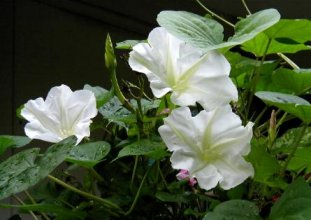Chapter Four: The Twilight Beauty
Yūgao, twilight beauty, evening face, and moonflower.
Japanese Moonflower folk-tale:
About the Moonflower (Ipomoea alba):
Its connection to the "evening face" is due to the fact that
the buds blossom most beautifully in the late afternoon and evening, but closes at dawn.
Has a nice perfume smell, but attracts moths.
(http://www.ces.ncsu.edu/depts/hort/consumer/factsheets/vines/ipo mea_alba.html)
(http://www.floridata.com/ref/i/ipom_alb.cfm)
In relation to Genji:
Japanese Moonflower folk-tale:
A couple is refused permission from the mayor to adopt a child, because they are too poor. The husband (a horse farmer and her cousin) is worried because without children, there will be no descendents to honour the memories of their ancesters.(http://www.pantheon.org/areas/folklore/folktales/articles/moonfl ower.html)
A mouse-sized silvery white horse enters the home through a moon beam. On its back is a red cherry tree branch and a tiny baby - named Moonflower. The moon's voice speaks to the couple, giving the black-haired baby to the couple as a gift, theirs to raise until she reaches her 18th birthday. She will bring the couple happiness and good fortune, but is destined to leave them and is forbidden to marry anyone from Earth. The tiny baby then grows to a regular earth baby size, and is revealed to be holding a grand ruby.
The ruby is sold for money, over the years the couple's farm does indeed become very prosperous. Moonflower herself grows up to be beautiful and well-recieved by the community. The couple is still concerned with the prospect of Moonflower leaving them, and once again faced with having no hope for grandchildren. Moonflower smartly suggest that they ask to adopt now, since they are no longer poor. The parents agree, and are successful in adopting three boys and two girls.
On Moonflower's 18th birthday, the parents throw her a big party, inviting the entire village. A silver moon-beam lights a cherry tree, and beautifully dressed moon people materialize, joining in the festivities. A young man from the moon people appears, and asks Moonflower to return with him. He brings the moon horse that had carried Moonflower as a baby and now resides in his stables. The voice of the moon speaks, and says that because the couple has used the years well and brought happiness to many children, they will be awarded by visits from Moonflower and her husband and children every year. The occasion then transforms into a wedding as Moonflower, and as they depart they spot two moon horses by the cherry tree, a final gift from the Moon.
About the Moonflower (Ipomoea alba):
Its connection to the "evening face" is due to the fact that
the buds blossom most beautifully in the late afternoon and evening, but closes at dawn.
Has a nice perfume smell, but attracts moths.
(http://www.ces.ncsu.edu/depts/hort/consumer/factsheets/vines/ipo mea_alba.html)
(http://www.floridata.com/ref/i/ipom_alb.cfm)
In relation to Genji:
- As a vine, the moonflower is dependent on a supporting structure, it can not thrive otherwise. One of Genji's men describes the ones crawling over the fence in front of Yūgao's house as "pitiful" (56). Their reaction to the flowers is unfavourable, suggesting that they have come during the day when the petals have withdrawn, giving it a shrivelled apperance. Like the moonflowers, the fan that the servant gives Genji is "intensely perfumed" (56), and is inscribed with a poem from Yūgao.
- Yūgao's poem (57) not only questions Genji's identity, but also identifies her own position to him as the evening flower. Like the disguised writing, the verse also acts as a disguised invitation.
- The beauty of the moonflower is hidden from view during the day. Similarily, during the day Yūgao and the other ladies are hidden away inside the house, their beauty is not for public display.
- The house acts as a medium of support for Yūgao, like a vine she needs it to survive. When she is removed from it she becomes fearful, judging from her responses to Genji it seems that she is very sheltered. Her trust in Genji is "inexplicably gone" (64), suggesting that he is is not able to take on the role of protection and support that the house offered.
- The consequence for leaving the house for Yūgao is death. Although Genji is confident he would remain unharmed by the spirits, he fails to safeguard Yūgao from harm. Like the moonflower, when the sun rises Yūgao begins to shrivel- she perspires heavily before meeting her death. The short time they share together is intense and sweet, but her death ultimately reaffirms the transitory nature of beauty.
- Possible connections to the folktale: Genji as the handsome young man who retrieves Moonflower from her rural farm home. Compared to her surroundings, Yūgao possesses a delicacy and grace that does not fit with the rough and uncouth neighborhood that she resides in. As a descendant of the emperor, Genji can be seen as a kind of figure descended from the heavens. Furthermore, the night they spend together is also the greatest full moon of the year.


1 Comments:
At 12:05 PM, Ann Wilson said…
Ann Wilson said…
It's ironic that in chapter 2 the Broom tree when the men are talking about different kinds of women- one of them brings up "I found that sort of uncalled-for forwardness strange and up setting....Please beware of the pliant easy woman. Any slip of hers can make her husband look like a fool" (31)and then the To no Chujo starts in telling the story of the Twilight beauty. The twlight beauty was forward with Genji and makes To no Chujo look the fool later in the story when Genji treats his daughter as his own
Post a Comment
<< Home